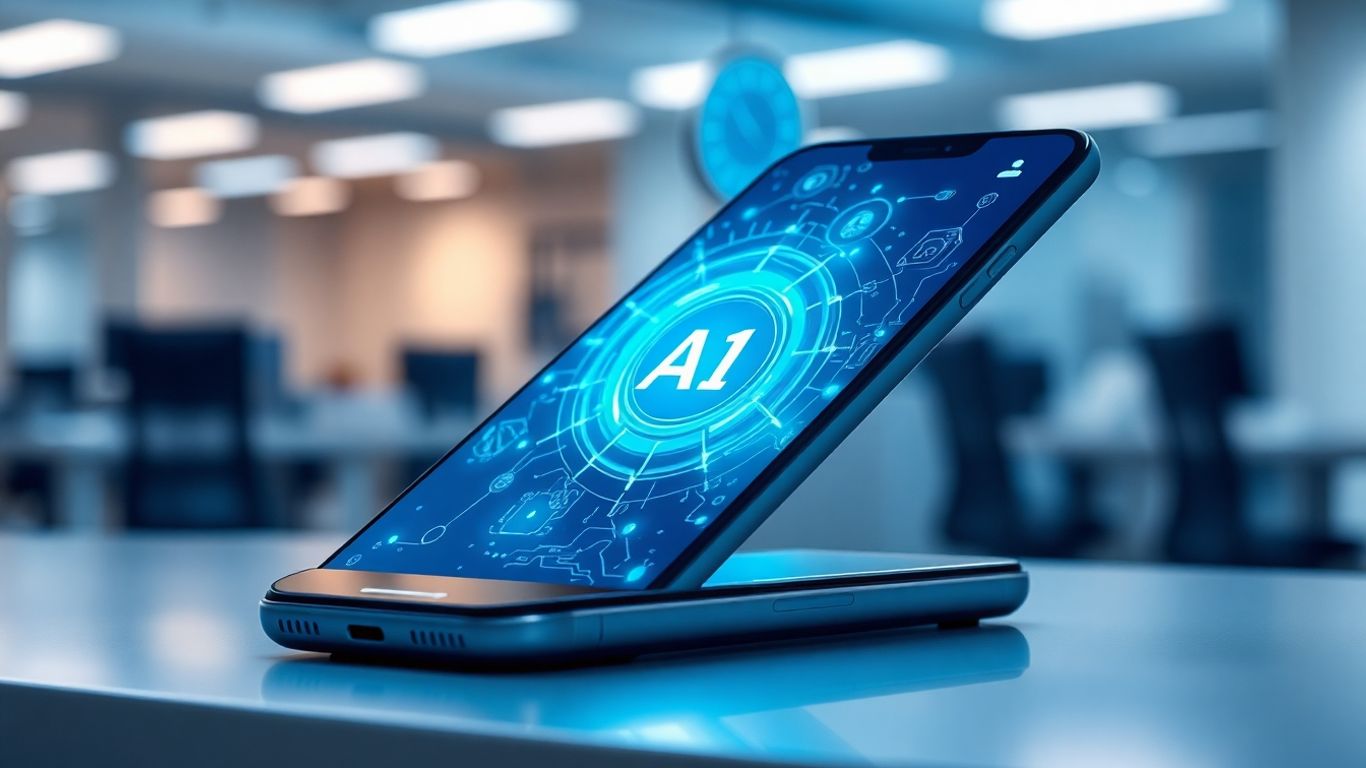Remember when you'd call a business and get that boring "leave a message after the beep"? Yeah, those days are pretty much over. In 2025, things are different. We've got these smart AI answering machines now that can actually talk to people. It's not just about taking messages anymore; it's about making calls work for your business, 24/7, without you having to be there. Think of it as your business having a super-efficient, always-on receptionist that never sleeps. This tech is changing how companies connect with their customers, and honestly, it's pretty cool.
Remember the days of endless busy signals and the dreaded "please leave a message after the beep"? Those days are fading fast. We're in the middle of a big shift in how businesses handle phone calls, and it's all thanks to artificial intelligence. An AI answering machine isn't just a fancy voicemail; it's a smart virtual assistant that can actually talk to your customers. Think of it as your first line of defense, ready to greet callers, understand what they need, and even take action, all without a human needing to lift a finger. This technology is changing the game, making sure no call goes unanswered and every potential customer feels heard.
By 2025, expecting instant responses from businesses is the norm. Customers want their questions answered and issues resolved right away, no matter the time of day. This is where AI answering machines really shine. They can handle a huge volume of calls simultaneously, something a human team would struggle with. This means your business can keep up with demand, even during peak hours or unexpected rushes. It’s about making communication smoother and more efficient for everyone involved. This technology is becoming a standard tool for businesses looking to stay competitive and provide top-notch service.
Traditional voicemail systems are pretty basic. You leave a message, and then someone has to listen to it, figure out what it means, and get back to the caller. There's a delay, and sometimes messages get missed or misunderstood. An AI answering machine takes this a step further. It can understand spoken words, figure out the caller's intent, and then act on it. It can book appointments, answer frequently asked questions, or route the call to the right person. It's a massive upgrade from just recording messages.
Relying solely on traditional voicemail in today's fast-paced market is like trying to win a race with a handicap. An AI answering machine provides the speed and efficiency needed to keep up and get ahead, ensuring you capture every opportunity that comes your way. It's a smart move for any business aiming for growth and better customer relations.

Think about it: your business doesn't just stop existing when the clock hits 5 PM or on a Saturday. Customers have needs and questions at all hours. Relying solely on traditional voicemail means you're essentially putting up a 'closed' sign when you're not physically there, and that's a surefire way to lose out on potential business. An AI answering machine changes that game entirely.
This is probably the biggest win. With an AI answering machine, your phone is always on. It doesn't need breaks, doesn't get sick, and doesn't clock out. Every single call that comes in, whether it's a potential new client looking for a quote at midnight or an existing customer with an urgent issue on a Sunday, gets handled. The AI can greet them, understand their basic needs, and capture their contact information. This means no more 'sorry, we missed you' notes or voicemails that get buried. Every inquiry is a potential opportunity waiting to be seized.
What happens when your team is swamped with calls, or when everyone's out for lunch? Usually, some callers get put on hold, some hang up, and some end up leaving a frustrated voicemail. An AI system acts as your tireless backup. It can step in automatically when your office lines are busy or when it's outside of your normal business hours. It provides that immediate interaction, letting the caller know they've been heard and that their request is being noted. This keeps customers engaged and reduces the chance they'll just go to a competitor.
Imagine a table showing how many leads you might be missing:
This isn't just about answering the phone; it's about actively bringing in business. The AI can ask qualifying questions, gather necessary details, and even book appointments directly into your calendar. It's like having a super-efficient receptionist working 24/7, ensuring that no matter when a customer reaches out, they're met with a professional response and their needs are captured for follow-up. This constant availability builds trust and shows customers you're serious about serving them.
Think about the last time you called a business and got put on hold forever, or worse, got a generic voicemail. It’s not a great feeling, right? Well, AI answering machines are changing all that. They're designed to talk to your customers in a way that feels natural, not like you're talking to a robot.
These AI systems are built to understand what people are actually saying. They don't just listen for keywords; they get the meaning behind the words. This means the AI can respond in a way that makes sense, almost like a real person. It can handle different questions and even follow along if the conversation gets a bit complicated. The goal is to make the caller feel heard and understood, not just processed.
One of the biggest wins here is speed. No more waiting on hold or for someone to call back hours later. The AI is ready to go the moment the call comes in, day or night. This means customers get answers or their issues addressed right away. Plus, the AI always responds the same way, every single time. It doesn't have bad days or get tired, so the quality of service stays high, no matter what.
It's not just about being fast and natural; it's about sounding like your business. You can set up the AI to use specific language, a certain tone, or even a particular voice that matches your brand. So, if your business is super friendly and casual, the AI can sound that way. If you're more formal and professional, it can adapt. This keeps your brand's personality consistent, even when you're not there to answer the phone yourself.
Let's be honest, a lot of the day-to-day stuff in running a business can feel like a broken record. You're answering the same questions, booking the same kinds of appointments, and trying to figure out who needs what. It's not exactly the most exciting part of the job, and it takes up a ton of time. That's where an AI answering machine really steps in to make things smoother.
Think about how many times a day you or your staff have to pull out a calendar, check availability, and then try to pencil someone in. It’s a back-and-forth that can take ages. An AI can handle this whole process. When someone calls wanting to book, the AI can check your real-time calendar – whether it's Google Calendar, Outlook, or whatever you use – and offer available slots. It can even confirm the booking right then and there, sending out an automatic confirmation email or text. This means no more double-bookings and way less time spent on the phone just trying to find a time that works for everyone.
Not every call needs to go to the same person, right? Some are urgent, some are sales inquiries, and some are just general questions. An AI can act like a super-efficient receptionist, figuring out what the caller needs and sending them to the right place. It can ask a few quick questions to understand the situation – like if it's an emergency repair or a new customer inquiry – and then route the call accordingly. This stops calls from getting bounced around and makes sure the right people get them quickly. It’s like having a smart assistant who knows everyone’s job.
When a potential new customer calls, you want to make sure you get all the important details. An AI can be programmed to ask specific questions to qualify leads. It can gather contact information, understand their needs, and even check if they meet certain criteria for your services. All this information is then automatically logged into your CRM or other systems. This means your sales team gets pre-qualified leads with all the necessary info, ready to go, without anyone having to manually type it all in. It’s a huge time-saver and helps ensure no potential business slips through the cracks because someone forgot to write down a detail.
Think about how we talk to each other. It's not just words; it's tone, context, and intent. Natural Language Understanding (NLU) is what lets AI get that. It's not just hearing "I need to book an appointment." It's figuring out when they want it, what service they need, and if they have any specific requests, all from a normal conversation. This means the AI can actually grasp what callers are trying to do, not just match keywords. It's the difference between a clunky chatbot and a helpful assistant.
Nobody likes waiting on the phone, right? Especially when you just need a quick answer or to get something booked. Our AI is built for speed. We're talking response times measured in milliseconds. This isn't just about answering fast; it's about keeping up with the natural flow of a conversation. It means the AI can handle complex questions or requests without that awkward pause where you wonder if it's frozen. It makes the whole interaction feel smooth and human-like, turning potentially frustrating calls into positive experiences. It's like talking to someone who's incredibly knowledgeable and always ready with an answer.
Sometimes, sending a text message during a call is way more efficient than talking it through. Imagine someone asks for pricing. Instead of reading out a long list of numbers, the AI can instantly text them a link to your rate sheet. Or if they want to book an appointment, it can send over your scheduling link right then and there. You can set up these simple rules in plain English. For example, "If the caller asks about product specs, text them the PDF link." The AI understands when that situation comes up in the conversation and sends the text automatically. It's a smart way to give callers the info they need, fast, without interrupting the main phone chat.
Think of your business tools like puzzle pieces. For years, getting them to fit together nicely has been a headache, right? You've got your customer relationship manager (CRM), your scheduling software, maybe some project management apps – all doing their own thing. An AI answering machine isn't just another piece; it's designed to connect those existing pieces so they actually work together.
This is where things get really practical. When your AI answers a call and gathers information, it can automatically update your CRM. Imagine a new lead calls; the AI captures their details and creates a new contact in Salesforce or HubSpot without you lifting a finger. For service businesses, this sync extends to dispatch tools. If a customer calls needing a repair, the AI can log the request and even assign it to the next available technician in your system, like ServiceTitan or Jobber. This means less manual data entry and faster response times.
Double-booked appointments? That's a thing of the past. An AI answering machine can connect directly to your team's calendars – whether it's Google Calendar, Outlook, or another scheduling platform. When a caller wants to book a meeting or an appointment, the AI checks real-time availability and books it directly into the correct calendar. It can even help optimize routes for field staff by scheduling appointments logically based on location and availability.
Beyond CRMs and calendars, the real power comes from connecting to a wide range of other apps. Many AI answering systems offer integrations through platforms like Zapier, which connects to thousands of different applications. This means you can set up custom workflows. For example:
The goal here is to make your AI answering machine the central hub that talks to all your other business tools. It's not about replacing your existing systems, but making them work in harmony, saving you time and reducing errors.
This level of integration means your AI receptionist isn't just taking messages; it's actively participating in your business operations, making sure information flows smoothly and tasks get done automatically.

So, you've got this fancy AI answering machine handling your calls, which is great. But what's actually happening on those calls? That's where the analytics come in. It's not just about picking up the phone; it's about understanding what people are saying and what you can do with that information.
Think of your analytics dashboard as the command center for your calls. It gives you a live look at what's going on. You can see things like:
This kind of data is gold. It means you're not just guessing anymore; you're making choices based on actual numbers.
Beyond just the numbers, the AI can actually help you understand how customers feel. It can transcribe calls, and then analyze those transcripts to pick up on keywords or phrases that indicate satisfaction or frustration.
This isn't about spying on your customers; it's about listening. Really listening. When you know what's making people happy or frustrated, you can fix it. That's how you build a better business.
Putting all this information together lets you make smarter moves. Instead of just reacting, you can plan ahead. For example:
Basically, the AI answering machine isn't just a receptionist; it's a data collection and analysis tool that helps you see your business more clearly and grow it more effectively. It turns every call into a learning opportunity.
Let's talk about saving money and getting more done. It sounds like a dream, right? But with an AI answering machine, it's actually becoming a reality for a lot of businesses. Think about it: instead of paying for extra staff just to answer phones during busy times or after hours, you've got an AI handling it. This isn't just about cutting corners; it's about being smarter with your resources.
Remember when you absolutely had to have a human being sitting by the phone during all business hours, and maybe even a few extra people for overflow? That's a big chunk of your budget right there – salaries, benefits, office space. An AI receptionist does a lot of that job, 24/7, for a fraction of the cost. It can greet callers, answer common questions, and even book appointments. This means you can potentially reduce the need for a large front-desk team or expensive answering services, especially for smaller businesses or those with fluctuating call volumes. It's like having a super-efficient, always-on employee who doesn't need breaks or overtime pay.
When your business gets busy, like really busy, what happens? Usually, you either miss calls or you have to scramble to hire more people. An AI answering machine changes that game. It can handle hundreds, even thousands, of calls simultaneously without breaking a sweat. So, if your business suddenly goes viral or you get a huge influx of inquiries, your AI can scale up instantly to meet the demand. You don't need to worry about training new staff or finding extra desks. The AI just handles it, keeping your customer service consistent even during peak times. This lets you grow your business without the usual headaches and costs associated with expanding your human workforce.
What do your employees do when they're not answering basic questions or scheduling appointments? Hopefully, they're working on things that really move the needle for your business – complex problem-solving, building client relationships, developing new strategies, or handling intricate sales. When an AI takes over the routine, repetitive phone tasks, your human team gets that time back. They can focus on the work that requires their unique skills and judgment, the stuff that AI can't (yet) do. This not only makes your employees happier and more engaged but also makes your business more productive and innovative overall. It’s about using your people’s talents where they matter most.
The real win here is redirecting your team's energy. Instead of getting bogged down by routine inquiries, they can tackle the challenges that truly drive growth and customer loyalty. It's a shift from reactive call handling to proactive business development.

When you're using an AI answering machine, especially one that handles customer calls, you've got to think about security and following the rules. It's not just about answering the phone; it's about protecting the information that comes through. This means picking a service that takes data protection seriously.
Think about the details people might share over the phone – names, addresses, maybe even payment info or health concerns. An AI answering service needs to keep all that private. Good systems use things like encryption to scramble the data so unauthorized people can't read it. They also have ways to control who can access what information, so only the right people in your company can see sensitive call logs or customer details. It’s like having a secure digital vault for your customer interactions.
Different businesses have different rules they need to follow. For example, if you're in healthcare, you'll need a system that's HIPAA compliant. If you deal with customer data from Europe, GDPR is a big one. Many AI answering services now offer features specifically designed to meet these standards. This can include:
For larger businesses or those handling very sensitive information, looking for "enterprise-grade" security is key. This usually means the provider has gone through rigorous testing and has certifications to prove they meet high security standards. Certifications like SOC 2 Type II or ISO 27001 show that the company has strong internal controls and processes for managing data security. It’s a sign that they’re not just talking about security, but actively building it into their service. This level of protection helps build trust with your customers, letting them know their information is in good hands, even when they're talking to an AI.

So, you're ready to jump into the AI answering machine world. That's great! But with so many options out there, how do you pick the one that actually fits your business? It’s not just about getting an AI, it’s about getting the right AI. Think of it like picking a new employee – you want someone who fits the team, does the job well, and doesn't cost a fortune. Here’s a breakdown of what to look for.
When you're shopping around, don't just look at the flashy promises. Dig into the actual features. What can it really do for you?
This is where the AI really shines, or sometimes, falls flat. Nobody likes talking to a robot that sounds like it’s reading from a script in a monotone. You want something that sounds natural, almost human.
The goal here is to make the caller feel heard and helped, not like they've stumbled into a bad sci-fi movie. A good AI voice and well-written scripts make all the difference in how customers perceive your business.
What happens when your business grows, or you have a sudden rush of calls? Your AI answering machine needs to keep up.
Picking the best AI answering service for your business can feel tricky. You want something that answers calls all day, every day, and helps you grab new customers without missing a beat. Think about what features matter most to you, like booking appointments or qualifying leads. Ready to see how an AI phone receptionist can change your business? Visit our website to learn more and get started!
So, there you have it. We've talked about how AI answering machines are no longer some far-off sci-fi idea. They're here, and they're ready to seriously change how businesses handle calls. Think about it – never missing a lead, giving customers instant answers day or night, and freeing up your team for the really important stuff. It’s not just about saving a few bucks; it’s about running a smoother, more professional operation. If you’re still on the fence, maybe it’s time to give one of these systems a try. Your future self, and your customers, will probably thank you.
Think of an AI answering machine like a super-smart robot receptionist for your business. It can answer calls, talk to customers like a real person, and even do things like set up appointments or answer common questions. It's available all the time, so you never miss a customer.
Voicemail just records messages for you to check later. An AI answering machine actually talks to the caller right away, understands what they need, and can help them immediately. It's like having a live person answer the phone, but it's AI!
Not at all! The best AI answering machines are designed to sound very natural, almost like a real human. They use advanced technology to understand and respond in a friendly and professional way, matching your business's style.
Absolutely. Unlike human receptionists who can get overwhelmed, an AI can handle tons of calls at once without getting flustered. This means no more busy signals for your customers, even during peak hours or unexpected rushes.
It's fantastic at catching potential customers. When someone calls, the AI can ask them questions to see if they're a good fit, gather their contact info, and even book a meeting for you. This means you won't miss out on sales opportunities.
Yes, most modern AI answering machines can connect with your other important software, like your customer relationship management (CRM) system or calendar. This helps keep all your business information organized and up-to-date automatically.
Generally, it's much more affordable than hiring human staff to cover all the hours. You get 24/7 coverage without the cost of salaries, benefits, and office space for a full reception team. Many offer free trials so you can test them out.
It can be programmed to answer a wide range of questions about your business, like your hours, services, pricing, or location. It can also guide callers to the right person or department if it can't answer directly.
Start your free trial for My AI Front Desk today, it takes minutes to setup!








